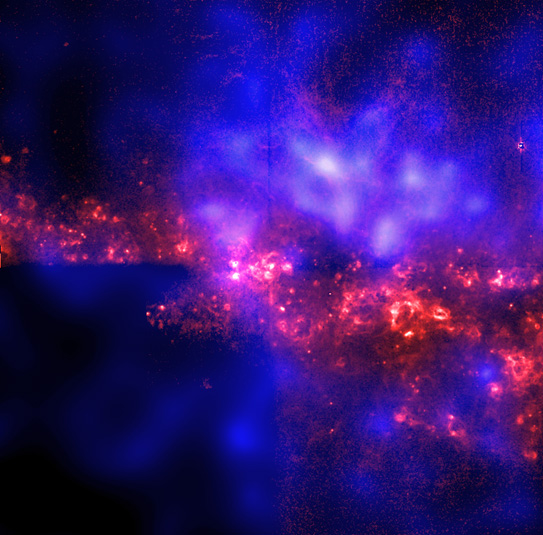

COURSE DESCRIPTION:
After preliminary lectures and readings, members of the class will read and discuss papers involving recent science news and national space-science policy. The seminar-like discussions will deal with current and future NASA space missions and the science that can be done with them.This seminar will meet for 15 weeks during the term each MWF (10:00 pm), starting Monday Jan. 10 and concluding Friday April 29. The format will begin with introductory lectures by Shull and other APS faculty members, followed by student-led discussions and presentations. For some classes, I will assign teams of students to lead a debate-format discussion of the ``topic of the week''. Prior to these discussions, all students will submit short written position papers on the debate topic. Each student will review several papers throughout the semester. However, all students are responsible for reading the weekly paper. Please treat this reading seriously and come prepared to describe and discuss the major results. The seminar discussions will be much less effective if some members of the audience remain silent on the topic. The class will be limited in size (25 students maximum) to facilitate active and vigorous discussion.
SEMINAR TOPICS AND READING:
Jan. 10 - Background Lecture 1 - Space Science Overview (Mike Shull)
Jan. 12 - Background Lecture 2 - X-ray Astronomy (Mitch Begelman)
Jan. 14 - Background Lecture 3 - Hubble Space Telescope (Mike Shull)
Jan. 17 - Holiday (Dr. Martin Luther King) - no class
Jan. 19 - The NASA "Space Exploration Vision" (Moon, Mars and Beyond)
Jan. 21 - Debate #1 (Hubble Servicing: Humans or Robots?)
Jan. 24 - NASA Funding; Future of Space Exploration (Dick McCray)
Jan. 26 - The Modern Universe Space Telescope (10m UV-O Vision Mission - James Green)
Jan. 28 - Debate #2 (Moon-Mars-Beyond motivation-- Science or Industry?)
Jan. 31 - Discussion (NASA strategic planning)
Feb. 2 - Discussion (NASA strategic planning and new missions)
Feb. 4 - Debate #3 (Origins, Evolution, and Fate themes)
Feb. 7 - Discussion (Constellation-X, LISA, TPF Missions)
Feb. 9 - Discussion (JWST, TPF Missions)
Feb. 11 - Debate #4 (Space Shuttle/ISS vs. New Missions)
Feb. 14 - Discussion (Planetary Roadmap)
Feb. 16 - Discussion (Mars Roadmap)
Feb. 18 - Guest Lecture (Fran Bagenal) - Exploration of Outer Planets
Feb. 21 - Guest Lecture (Brian Hynek) - Results from Mars Rover
Feb. 23 - Guest Lecture (Bob Pappalardo) - Plans for Europa
Feb. 25 - Guest Lecture (Larry Esposito) - Cassini Results at Saturn
Feb. 28 - NASA's space astrophysics program
Mar. 2 - NASA's space astrophysics program
Mar. 4 - Debate #5 (Which NASA Programs to Save?)
Mar. 7 - Dark Matter and Dark Energy (NASA, NSF missions)
Mar. 9 - Dark Matter and Dark Energy (NASA, NSF missions)
Mar. 11 - Debate #6 (JDEM, Dark Energy Mission -- for or against?)
Mar. 13 - NAS decade study (large ground-based telescopes)
Mar. 15 - NAS decade study (large ground-based telescopes)
Mar. 17 - NAS decade study (large ground-based telescopes)
Apr. 4 - Debate #7 (Which Ground Based Telescope? GSMT or LSST)
Apr 6 - Sun and Solar System (SOHO, TRACE, Voyager, etc)
Apr 8 - Near-Earth Objects (asteroids, comets) and Impacts
Apr 11 - Near-Earth Objects (asteroids, comets) and Impacts
Apr. 13 - Guest Lecture (Dan Baker) - NASA Sun-Earth Missions)
Apr. 15 - Guest Lecture (Bob Ergun) - NASA Space Physics Missions)
Apr. 18 - Debate #8 (How to Save Sun-Earth Missions?)
Apr 20 - Lecture (TBD)
Apr. 22 - Guest Lecture (TBD)
Apr. 25 - Debate #9 (Near-Earth Asteroids -- detection?)
Apr. 27 - Debate #10 (Near-Earth Asteroids -- public policy?)
Apr. 29 - Last Class (wrap-up of term's themes)
May 3 (Tuesday, 1:30-4:00 pm) - Final Exam
Last modified Feb. 15, 2005 by JMS